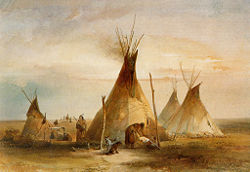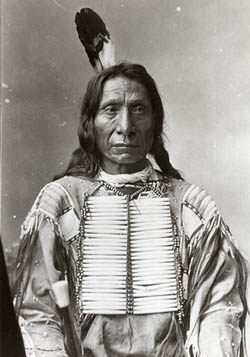
Sioux lands on the Great Plains were often coveted by homesteaders and settlers following the call of Manifest Destiny.
After the treaty of
Horse Creek (Fort Laramie) was violated by the U.S. Army and gold
prospectors, and after the news of Sand Creek reached the ears of
other tribes, the Sioux, Cheyenne and Arapaho went to war against
white encroachment of their lands. They ranged up and down
the North and South Platte rivers and well into Montana and
Colorado, burning stage stations, tearing down telegraph wires,
halting supply trains and the mail, and effectively cutting off
overland communications to Denver, Salt Lake, and San
Francisco.
(click here for more)

The
days when the nomadic tribes of the American West were the freest
people to walk the earth, were fast drawing to an end. These
were the first of the Plains tribes to experience this American
tragedy, and sadly, their grim and unyielding fate had become their
legacy from the lofty promises made at Horse Creek less than ten
years before.
In a footnote
to his commentary, historian Killoren writes that Agent Albert G.
Boone, Fitzpatrick's successor at the Platte River Agency, was
directed by Commissioner A.B. Greenwood to push the treaty signing
with the Cheyenne or "to make it over their heads." This new
and amended treaty was not ratified by the U.S. Senate until August
6, 1861. In the meantime, Kansas was admitted to the Union
without having title to the land. This was a flagrant
violation of both the Kansas/Nebraska act, and the conditions of
the treaty at Horse Creek, that were swept under the rug of
westward progress and the irreversible momentum of frontier
settlements.
Red Cloud (above), a
war chief of the Sioux, forced the federal government to surrender
on his terms in order to meet in treaty council in 1868 at Fort
Laramie. Once the agreement was signed and ratified,
recognizing the Sioux as the owners of the Black Hills in
perpetuity, President Grant started looking for new ways to provoke
war and force the Sioux and other plains tribes onto
reservations.
Related People
Related Events
Related Flashpoints
Related Places